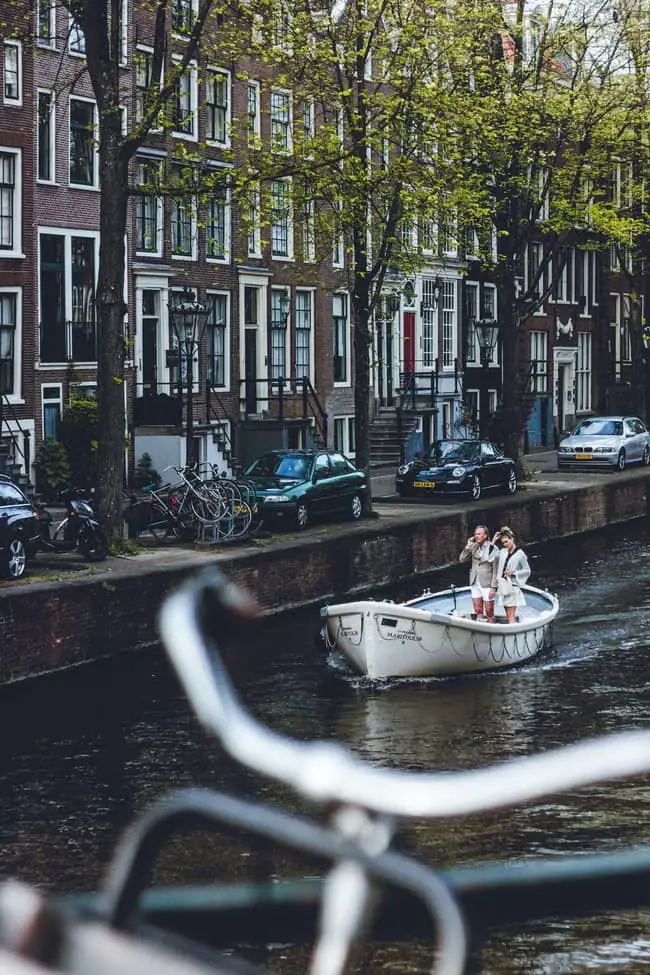Moving is always a headache, not only because of how many things you have to take care of but also because of the uncertainty, the amount of money you have to spend and all the little details that you miss but that can modify your budget. Moving to Amsterdam is certainly expensive, but there are different ways of calculating how much or finding cheaper options.
- Rent: 500 euros (room), 1000 (studio), 1500 (a flat in the suburbia)
- Deposit: 1 or 2 months rent (plus agency fee)
- Belongings: 30 euros (1st piece of luggage), 50-100 euros (1 box on the post, 20 kg or a piece of luggage internationally)
- Moving Company: 500-1000 euros (inside Europe, depending on the volume), over 1000 euros from outside of Europe.
- Moving to Amsterdam: 200 euros (plane ticket in Europe), 600-700 (plane ticket from outside Europe), 80-100 euros (bus), 100-200 euros (train), or car (plus expenses, parking space, etc)
- Bank Account: free
- Registration: free
- Health Insurance: +100 euros per person/per month
- Visa: EU free, some countries 60-150 euros
- Tuition Fee for university: 2000-10,000 euros

The cost of moving depends a lot on where you come from when going to Amsterdam, how much stuff you have if you are alone or you have a family, how much you are willing to pay and so on. In this article, you will find my case, as an example and all the rest of the options explained to help you out in this rough time.
Moving to Amsterdam: Cost
Amsterdam is one of the most expensive cities in Europe, so if I were you I would be ready to be openminded on the amount of money you are going to spend and more flexible on your budget. The good thing is, if you are moving to the Netherlands and you are planning on staying there permanently, you will also have a decent salary, which will allow you to live well: parttime and fulltime, both cases included.
In my case, as a student, I have always been working parttime and it has been enough to pay for everything I need. In the case of a person working fulltime, there is no problem whatsoever, but coming from other countries in the South of Europe, or other continents, it may look like a very expensive city.
I will talk about my case and how much I spent moving to the Netherlands, but I will also talk about all the options I have explored, my friends have done and I can come up with to help you out make your own budget. We will then do: my case, rent, transportation, boxes and belongings, furniture, bureaucracy, health insurance and so on.
Moving to the Netherlands: My Experience
I moved to Amsterdam while planning on studying Dutch and working on the weekends. This means that I was looking for a relatively cheap option and I couldn’t afford to live alone and having other luxuries. In my case, I found a room in a shared apartment (common not only for students but working people too) and just pay for the basic things I needed.
| Rent (a room in a shared house) | 500 euros |
| Deposit (1 month rent) | 500 euros |
| Agency Fee | 200 euros |
| Health Insurance | 100 euros |
| Transportation: Bus | 80 euros |
| Tuition Fee | 2000 euros |
| Luggage | 0 euros |
| IKEA | 100 euros |
| TOTAL | 3500 euros |
Since I was paying for everything myself I always looked for the cheapest options I could find. Here are my choices explained:
- Rent: a shared room close enough to the university (less than 5 km) is never cheaper than 500 euros. This is the minimum you can ask for and from there up.
- Deposit: I was asked for a 1-month deposit but some agencies ask for 2 months. Normally you sign a 1-year contract, something to consider too. You will always get it back.
- Agency Fee: I have moved many times and I haven’t had to pay for this always if you can find the place online by yourself. The first time I moved to the Netherlands I paid for an agency and the cost was about 200 euros for the room. If you are lucky, you may be able to skip this part.
- Transportation: I chose to come from Spain by bus (24 hours!!) but I thought it was super cheap, and adventure and I could bring up to 2 pieces of luggage for free. The rest of the trips, always by plane and it is more expensive and sometimes even more chaotic, at least for me.
- IKEA: getting some bedsheets, kitchen tools, pans and pots, towels and all the basics. You can order online and ask for delivery at home or go to the IKEA in Amsterdam South!
- Tuition Fee: you can pay it afterwards and not straight forward. You can ask for several payments and this depends. Since I have EU citizenship, for me it is only 2000 euros. Read more below.
- Health Insurance: I found out too late that if you are staying for over 90 days in the Netherlands you need private health insurance. Otherwise, you will get a fine (mine was over 400 euros). Health insurance is compulsory, around 100 euros per months the cheapest and you can ask for Government help. Read more below.

Here you will find some more general information for other budgets and other expenses you may want to consider. To find more about how much it costs to live in Amsterdam read this article: Cost of Living in Amsterdam.
Rent in Amsterdam
Renting is probably one of the most expensive parts of the process. Here are some of the options:
- Room: 500 euros or more
- Studio: at least 1000 euros
- Apartment: 1500 euros and most likely in the suburbia
You will have to consider paying 1 or 2 months rent of deposit. The specification should be in your contract and you will get your money back at the end of the contract.
If you get your home through an agency, you will have to pay either a percentage of the rent or like me, a 200-300 euros fee.
You can apply for Government help if your income is low. Check the requirements and more information in THIS ARTICLE.
Transportation: Moving to Amsterdam
Moving prices depend on where you live now. If you are in Europe you can move with the following:
- Car: depends on the tolls (from your country, there is none in the Netherlands, Germany or Belgium frontier), parking (at least 20 euros per day if you have to leave it in Amsterdam) and the gas.
- Bus: probably the cheapest option, from 50 euros onwards plus free luggage (2 pieces).
- Train: it depends on where and you have to pay for the 2nd piece of luggage (100-200 euros).
- Plane: it depends on where from, always to Schiphol (in Europe it normally is 100-200 euros), outside of Europe it is more expensive (500-700 euros one way). Plus 30 euros or more for each piece of luggage.
Luggage and Boxes
If you take your luggage with you and that is it, you can see the prices I listed right about each transportation. However, if you have more, it depends on many more factors. For Boxes, you have to options:
- Private company: these tend to be expensive and you have to contact one from your country of origin, not from the Netherlands. In some cases, you can you pay for the box, in some others, you pay for the volume of the track, etc. I calculate at least 500-1000 euros in Europe and over 1000 from another continent. More here.
- Post: also contacting your local post. I would recommend this if you have one or two boxes and you have someone who can send it over. In my case, I have done it and it costs 60-70 euros to send a piece of luggage and probably 30-40 for a 15-20 kg box.
Furniture
In most of the cases, studios and rooms in the Netherlands are already furnished. In case you are not so lucky there are many places to buy whatever you want, from design to IKEA. These are some convenient options:
- Mediamarkt (for electronic devices)
- IKEA (in Amsterdam South, also doing delivery for very little money if you don’t have a car or the time)
- Secondhand shops where you will be able to find a little bit of everything (the most popular in Amsterdam, Rataplan)
Bureaucracy: Bank Account, VISA, Registration Fee, etc
In the case of bureaucracy, I have good news: opening a bank account in any bank is free, registration in the city hall is free, and EU citizens don’t need a visa.
Some visas cost 60 euros, other 150. This depends on what is the reason for your stay (read more about it here). In any case, if you move from outside of Europe with a job, your employer will have to pay for it and sometimes provide it for you beforehand. It is convenient to contact your embassy for more information, each country is different.
Health Insurance
If you are staying for over 90 days in the Netherlands, no matter for what reason this is, you need Dutch health insurance and these are private. Even if you are from the EU, you will have to pay.
Good news: if your income is low you will have some Government help to pay for the insurance. This is called Zorgtoeslag and you can read more about this in HERE.
Bad news: you HAVE TO get the insurance and it costs at least 100 euros per months or more, depending on the coverage you have.
Tuition Fee: for University Students
I wrote a full article about tuition fees: it depends on whether you are an EU citizen or not. This is why the price fluctuates between 2000 and 10,000 euros.
Once you are accepted, you will have to pay at least the first fee of 1/4 or 1/5 of the total. Learn everything you need to know about tuition fees here.